(TheNewswire)




January 27, 2021 - TheNewswire - Vancouver, British Columbia - Bearing Lithium Corp. ( “Bearing” or the “Company” ) (TSX V :BRZ) (OTC:BLILF) is pleased to provide a significant update on the advanced progress of the Maricunga Lithium Project in Chile as announced by Minera Salar Blanco (“MSB”) .
The company’s proposed Maricunga Stage One has a nameplate capacity of 15,000 tonnes-per-year of lithium carbonate production, with significant future expansion potential from subsequent stages. The Maricunga project, the highest-grade, undeveloped lithium project in Chile, is managed by Minera Salar Blanco (MSB), which is owned by LPI (51%), Borda Group (31%) and Bearing Lithium (18%).
__________________________________________________________________________________
Maricunga Stage One Update
A new field program will be undertaken from February 2021 to update detailed engineering work to re-size and optimise the revised Maricunga Stage One development. The program consists of 2,400m of drilling, along with sampling and hydraulic testing activities. This work is in line with the announcement made by the Company on 9 December 2020 to advance the Maricunga project in a number of stages and by fast-tracking a Stage One development based on the tenements known as ‘Old Code’ concessions.
The target is to expand the current resource, which is from near surface to 200m depth, to include the interval between 200m and 400m. Drilling for the project’s DFS established that there was a thick sequence of volcaniclastic material (established by MSB’s historical S-19 exploration hole drilled to 362m, Figure 1) beneath gravel and near surface clay units in the ‘Old Code’ concessions. This zone has high drainable porosity and permeability that is considerably higher than near surface units. Expansion of the resource would result in expansion of the project brine reserve, potentially supporting a 20 year-plus mine life for the project.
Drilling contracts have been awarded to international companies Major Drilling and Andinor, and all drilling equipment has been mobilised to site.
Additionally, conceptual and numerical hydro-geological models including LEAPFROG, SGeMS and FEFLOW will be updated by Atacama Waters (formerly FloSolution) with the new exploration information and all existing information from the 2019 Definitive Feasibility Study. That would allow the existing resources and reserves within the “Old Code” concessions to be fully revised.
An updated Definitive Feasibility Study will then be prepared by Worley and GEA Messo in accordance with JORC and NI 43-101 international standards.
In parallel with this Stage One work, MSB will continue to evaluate and progress alternative development plans for the subsequent stages with Codelco, potential other parties and the Chilean authorities. The aim of these subsequent stages is to continue with the original strategy to consolidate the Maricunga Salar by developing the remainder of its mining concessions, known as “New Code” concessions, to provide substantial organic growth for the project.
Activities associated with engineering and financing will continue, complementing the adjustments on the Stage One design of the project and to ensure continuity in fast-tracking the development timeline through 2021.
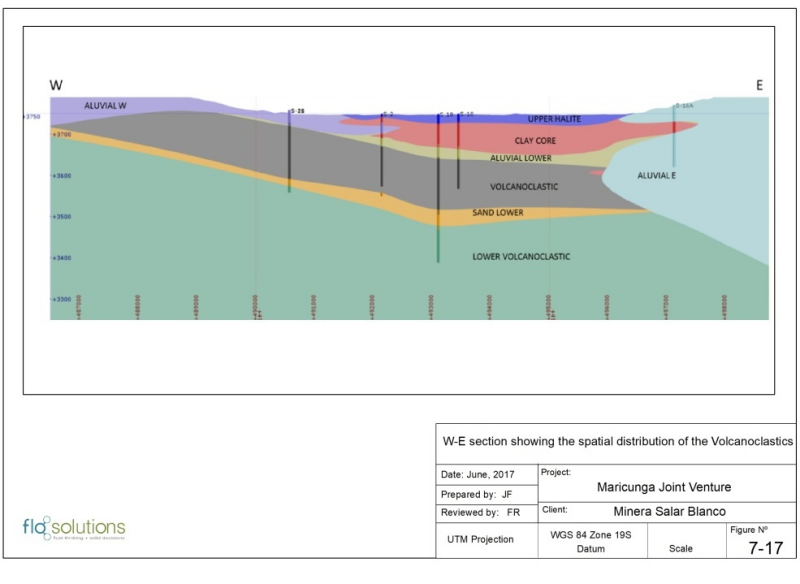
Click Image To View Full Size
Figure 1 - West to East section, looking north, through historical drilling, with the target for the 400 m holes the lower volcaniclastic. Historical MSB hole S19 drilled to 362 m
Stage One Working Plan
-
- Drilling Program
-
- Five diamond core exploration holes to 400m depth. The boreholes once completed will be habilitated as monitoring wells, with 3-inch diameter slotted and blank PVC casing to selected depth intervals.
- Brine porosity samples will be collected during the core drilling at 24m depth intervals in the 0m – 200m interval and 12m intervals between 200m – 400m.
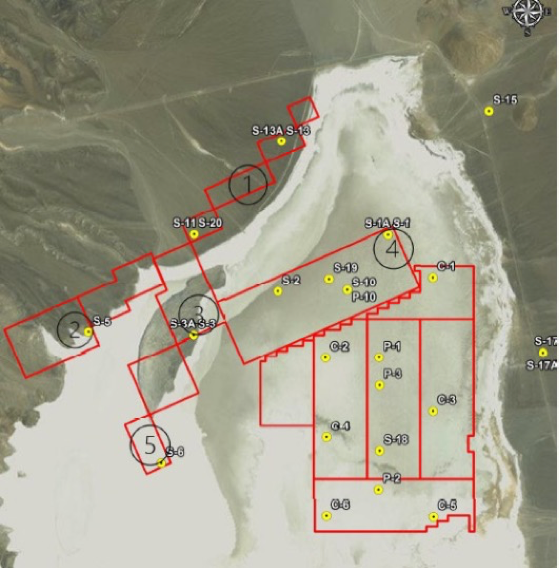
Click Image To View Full Size
Figure 2 - Proposed locations of the Five boreholes and the locations of the boreholes from the 2018-19 drilling program
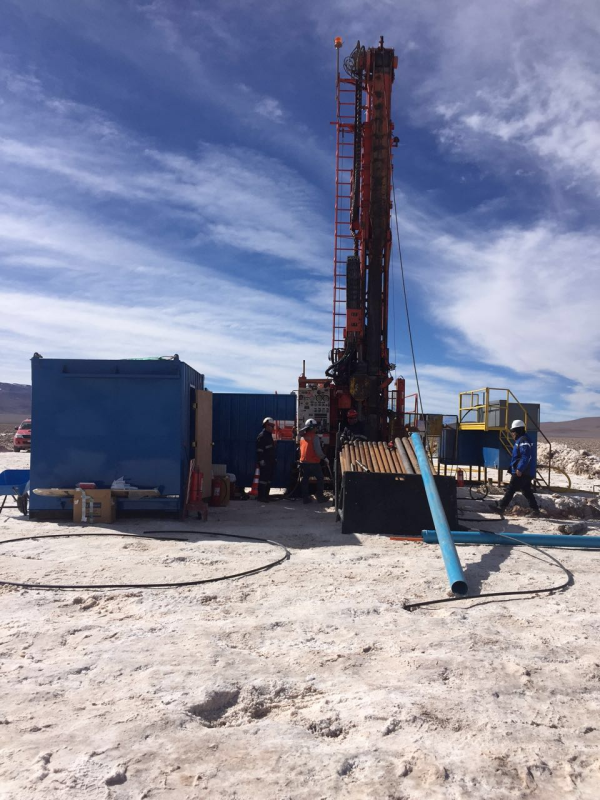
Click Image To View Full Size
Figure 3 - Drilling of the S19 borehole to 362 m in the 2018-19 drilling program
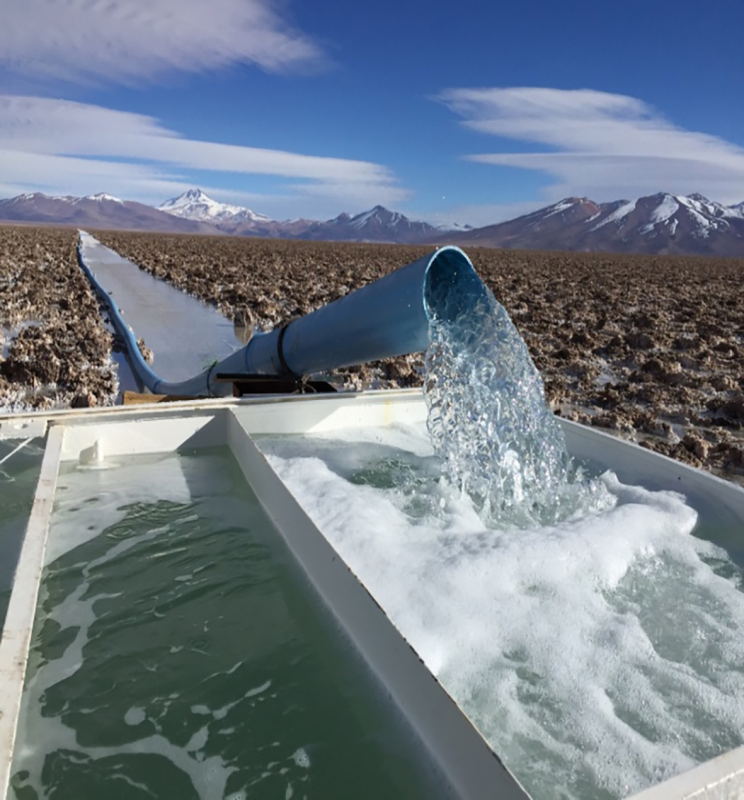
Click Image To View Full Size
Figure 4 - Production Well –P 10 pump testing of the DFS released January 2019
Stage One Timeline
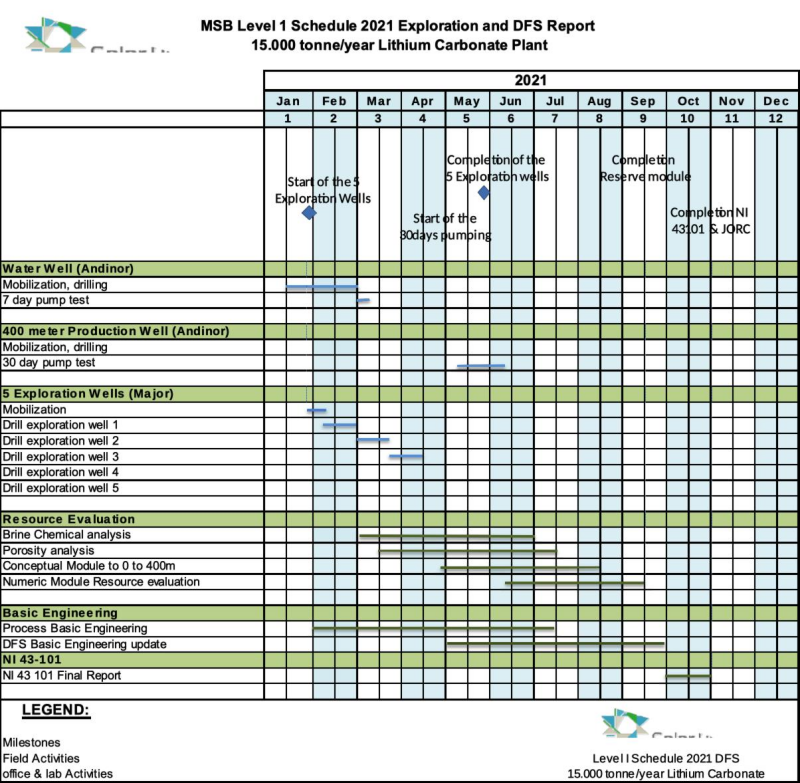
Click Image To View Full Size
Figure 3- Stage One Timeline for the updated Exploration and DFS Report
Camp Operation
To support drilling and other future site activities the existing MSB camp has been expanded, to accommodate contractor personnel. The temporary camp will continue to operate until project construction activities begin.
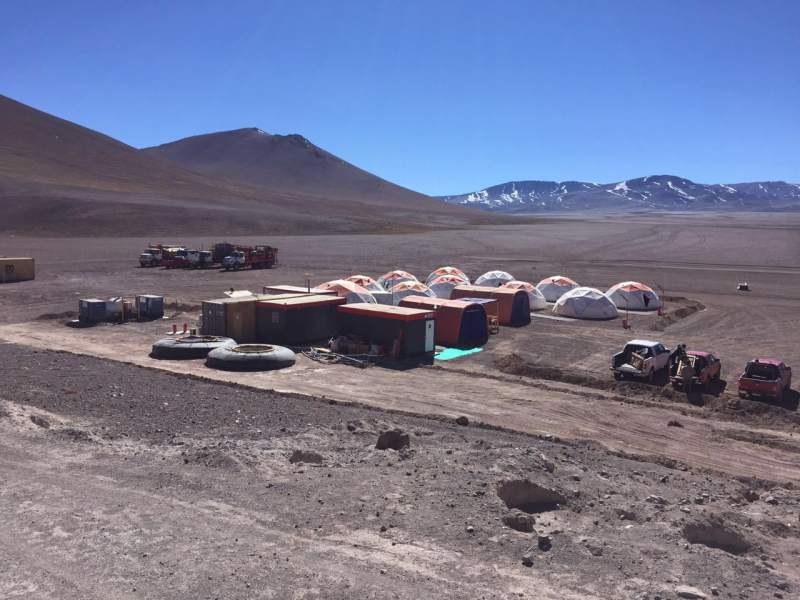
Click Image To View Full Size
Figure 5- Existing Camp to be expanded for the commencing of the Exploration program.
Additional water exploration
A new water supply exploration well will be drilled in the area to potentially have an alternative supply to the existing CAN-6 well for the project. Despite fresh water supply have been secured with the existing CAN-6 well, it’s deemed strategically important to explore for further water sources as alternative/backup. The well will be drilled as a large diameter production well, with an installed surface casing diameter of 24 inches. The water well will be drilled to a depth of up to 200m. Following installation and cleaning, the well will be subject to a 30-day pumping test to confirm the aquifer characteristics and the size of pump which is optimum for operation of this new well.
Lithium Power International’s Chief Executive Officer, Cristobal Garcia-Huidobro, commented:
“We are pleased to announce that work program is already underway for the Maricunga Stage One strategy. Building on the already extensive technical work will not only let us significantly expand the current resource, but also strengthening the profile of the project. Our world class group of technical partners have mobilized already and we look forward to providing regular updates on the progress. In addition, and in line with the current market interest, we continue evaluating strategic and financing alternatives to maximize the value of the Project for its shareholders.”
Bearing Lithium Corp’s Chairman, Gil Playford, remarked:
“ Given Covid-19 has slowed progress in 2020, I am very pleased MSB is advancing our low cost Maricunga Lithium Project in a number of stages by fast-tracking a first stage development of 15,000 mtpa from its “Old Code “ grandfathered properties. By adding additional mining resources from this year’s exploration program will extend the mining life and expansion potential for MSB. Codelco’s joint venture discussions for Stage 2 “New Code” concessions adds further growth prospects "
About Bearing Lithium Corp.
Bearing Lithium Corp. is a lithium-focused mineral exploration and development company. Its primary asset is a 17.35% interest in the Maricunga Lithium Brine Project in Chile. The Maricunga Project represents one of the highest-grade lithium brine salars globally and the only pre-production project in Chile. Over $US 58 million has been invested in the Maricunga Project. All Project Expenditures through to the delivery of a Definitive Feasibility Study in January 2019 have been fully funded by the 51% earn-in joint-venture partner , Lithium Power International. Subsequently, the Company has subscribed for shares in MSB amounting to $US 1,261,421 for Fiscal Year 2019 and $US 782,081 for Fiscal Year 2020.
ON BEHALF OF THE BOARD
Signed "Gil Playford”
Gil Playford, Chairman
gplayford@bearinglithium.com
Neither the TSX Venture Exchange nor its Regulation Services Provider (as that term is defined in the policies of the TSX Venture Exchange) accepts responsibility for the adequacy or accuracy of this release.
Cautionary Statements Regarding Forward Looking Information
This press release includes certain "forward-looking information” and "forward-looking statements” (collectively "forward-looking statements”) within the meaning of applicable Canadian and United States securities legislation including the United States Private Securities Litigation Reform Act of 1995. All statements, other than statements of historical fact, included herein, without limitation, statements relating the future operating or financial performance of the Company, are forward-looking statements.
Forward-looking statements are frequently, but not always, identified by words such as "expects”, "anticipates”, "believes”, "intends”, "estimates”, "potential”, "possible”, and similar expressions, or statements that events, conditions, or results "will”, "may”, "could”, or "should” occur or be achieved.. Actual future results may differ materially. There can be no assurance that such statements will prove to be accurate, and actual results and future events could differ materially from those anticipated in such statements. Forward-looking statements reflect the beliefs, opinions and projections on the date the statements are made and are based upon a number of assumptions and estimates that, while considered reasonable by the Company, are inherently subject to significant business, economic, competitive, political and social uncertainties and contingencies. Many factors, both known and unknown, could cause actual results, performance or achievements to be materially different from the results, performance or achievements that are or may be expressed or implied by such forward-looking statements and the parties have made assumptions and estimates based on or related to many of these factors. Readers should not place undue reliance on the forward-looking statements and information contained in this news release concerning these times. Except as required by law, the Company does not assume any obligation to update the forward-looking statements of beliefs, opinions, projections, or other factors, should they change, except as required by law.
Copyright (c) 2021 TheNewswire - All rights reserved.